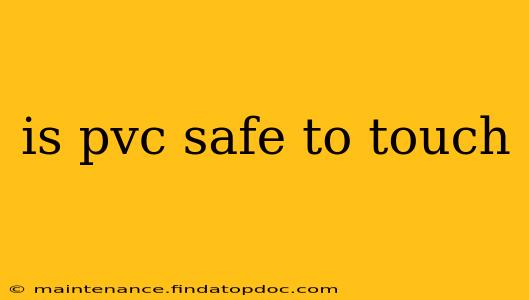Polyvinyl chloride (PVC) is a ubiquitous material found in countless products, from pipes and flooring to clothing and medical devices. A common question arises: is PVC safe to touch? The answer, unfortunately, isn't a simple yes or no. The safety of touching PVC depends on several crucial factors, which we'll explore in detail.
What is PVC and How is it Made?
PVC is a synthetic plastic polymer made from the monomer vinyl chloride. The manufacturing process involves polymerization, where many vinyl chloride molecules chain together to form long PVC chains. During this process, various additives are incorporated to modify the PVC's properties, such as flexibility, durability, and color. These additives are key to understanding the potential safety concerns associated with touching PVC.
Is it Safe to Touch Raw PVC?
Generally, touching raw, unprocessed PVC isn't considered inherently dangerous. However, prolonged or repeated contact might cause minor skin irritation in some individuals due to potential residue from the manufacturing process. This is less a concern with the finished product and more of a hazard in industrial settings.
Is it Safe to Touch Finished PVC Products?
The safety of touching finished PVC products depends largely on the additives used during manufacturing. Many finished PVC products are deemed safe for regular handling and contact. However, some additives raise concerns. Let's delve into some specifics:
What Additives are Used in PVC and are they Safe?
PVC manufacturing often involves plasticizers, stabilizers, and other additives to enhance its characteristics. Some of these additives, especially certain plasticizers like phthalates, have raised concerns about potential health effects, including endocrine disruption. However, regulations regarding the use of these additives vary significantly across different regions and industries. Many manufacturers now use phthalate-free alternatives, addressing some of these safety concerns.
Can PVC Release Harmful Chemicals?
Certain PVC products, especially those manufactured with less-regulated additives or exposed to high temperatures, might release volatile organic compounds (VOCs) into the environment. These VOCs can cause health problems, particularly with prolonged exposure. While touching the PVC itself might not directly lead to VOC inhalation, the release of these compounds is still a factor to consider.
Are There Different Types of PVC with Varying Safety Profiles?
Yes, the safety profile of PVC can vary depending on its formulation and intended use. For instance, PVC used in medical devices is subject to stricter regulations and quality control compared to PVC used in construction. This means medical-grade PVC is generally considered safer for human contact than PVC used in other applications.
Frequently Asked Questions (PAA)
Here, we address some frequently asked questions about the safety of touching PVC, drawing on information gleaned from various online search engines' "People Also Ask" sections:
Is PVC toxic to humans?
The toxicity of PVC isn't inherent to the material itself but rather depends heavily on the additives used during its manufacturing process. While some additives have raised concerns about potential health impacts, many manufacturers now prioritize the use of safer alternatives. The level of risk is generally low with typical consumer products, assuming they conform to relevant regulations.
Can PVC leach chemicals?
Yes, certain PVC products can leach chemicals, particularly plasticizers, into the environment or into substances they come into contact with. The extent of leaching depends on factors such as the type and quantity of additives used, temperature, and exposure time. This is a more significant concern with flexible PVC products than rigid ones.
Is it safe to touch PVC pipes?
Generally, touching PVC pipes poses minimal risk, provided they're manufactured according to regulations and don't contain high levels of concerning additives. However, prolonged or direct contact with some pipes, especially those exposed to high temperatures or chemicals, might warrant caution.
Is PVC pipe safe for drinking water?
The safety of PVC pipes for drinking water is a complex issue subject to extensive regulations and testing. Many countries have established standards to ensure PVC pipes used in water systems meet safety requirements. While generally considered safe, potential leaching of chemicals remains a factor to consider, particularly if the pipes are old or poorly maintained.
Conclusion
Determining the safety of touching PVC isn't a straightforward answer. While many finished PVC products are considered safe for everyday handling, the use of certain additives remains a concern. Consumers should be aware of the potential risks, particularly regarding exposure to volatile organic compounds and the leaching of certain chemicals. Choosing products made with phthalate-free formulations and prioritizing reputable manufacturers can help mitigate potential risks. If you have specific concerns about a PVC product, consult the manufacturer's safety data sheet (SDS) for more detailed information.
